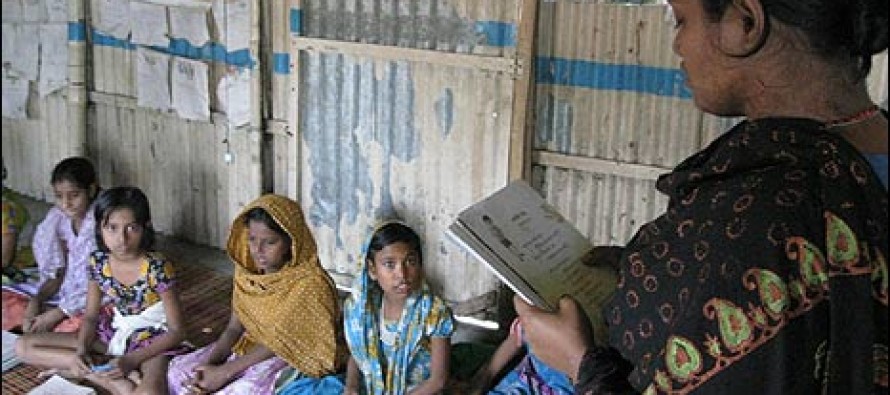Bangladesh and Millennium Development Goals

On 20 September, 140 world leaders started a summit in New York, on the sidelines of the 65th session of the UN General Assembly, aiming to inject a new sense of urgency into a global campaign to achieve the targets of Millennium Development Goals (MDG).
In 2000, the world leaders adopted the UN Millennium Declaration, committing their nations, to achieve a set of targeted goals in eight sectors, by 2015, such as
• Eradication of extreme poverty,
• Achievement of universal primary education,
• Promotion of gender equality,
• Reduction of child mortality
• Improvement of maternal health
• Combating HIV and other diseases
• Ensuring environmental sustainability
• Development of global partnership for development
So where are we now? With the above eight key goals, it appears that during the last ten years, many countries are behind the schedule and tens of billions of dollars will be needed to pay for the promises made in 2000. There is only five years left until the goals’ target date and the global economic crisis has badly hit the funding.
The UN secretary general, Ban Ki-moon, hopes to get new commitments of up to $45 billion during the summit. He especially expects to announce new money to combat child and maternal mortality where progress toward the goal worldwide is slow.
The European Union is to announce one billion dollar of MDG money and the World Bank $750 million dollars for education, according to aid groups. The US is not expected to make any significant new offer. Therefore proposals for innovative funding method are to be devised during the summit.
The industrialised countries are expected to pay as official development aid (ODA) 70 cents for every$100 dollar generated by economic activity, a target only five northern European countries now meet. The US pays only 20 cents or less per $100 dollar generated. Furthermore the financial crisis is not yet over in the West and all governments are cutting hugely their expenditures. In the light of the economic environment, it is not an appropriate time for getting funds from the Western countries.
Philippe Douste-Blazy, a former French foreign minister and now a special advisor to the UN leader on the topic, said: “we need to build on… about mobilising the sustainable, predictable and additional resources we desperately need to put the MDGs back on track. The example of the solidarity tax on airline tickets proves that micro contributions taken from large numbers of individuals yield important sums”. He highlighted possible imposition of tax on tourism, the internet, mobile phones and transactions of financial markets. However the Unites States and other free market nations are wary of imposing new surcharges on their tax-weary populations, according to diplomats.
On 19th September, Bangladesh received a UN award for its remarkable achievements in attaining the Millennium Development Goals, particularly in reducing child mortality. The rate of child mortality had gone down by almost two-thirds from 149 deaths per thousand live births in 1990 to 54 in 2008 in Bangladesh. The Prime Minister, Sheikh Hasina, accepted the award in New York. The award was conferred upon Bangladesh and five other countries a day ahead of the MDG conference.
In New York on 20th September, Prime Minister Sheikh Hasina presided over the opening session of the summit and spoke about the Bangladeshi experience of trying to achieve the MDGs. She pointed out that Bangladesh would require $4.4 billion a year to reach its own targets by the deadline of 2015.
On MDG goals, althoughBangladesh has taken some good strides in areas such as net enrolment in primary education (up from 61 per cent in 1990 to 92 per cent in 2008 — MDG-3), and eliminating gender disparity in primary as well as secondary education, it needs to drastically reduce dropout rates from primary education, and improve the standard of education provided in its schools and universities.
In order to reduce poverty, which is the aim of MDG 1, Bangladesh needs to create more secure employment opportunities for its working age population, a large portion of whom remain seasonally unemployed for long periods every year, as well as more employment opportunities in general for its women.
The maternal mortality rate, which had gone down by an impressive 40 per cent from 1990 to 2005, seems to have stagnated in recent years, and policymakers have to devise ways to reignite the decline, if the country wants to achieve the key target under MDG 5 of reducing maternal mortality by three quarters.
Bangladesh is vulnerable to the effects of climate change and has been struggling to maintain and protect bio-diversity including wet-lands and forests.
Many members of civil society in various countries believe that governmental actions need clarity and accountability. Transparency is a key to when it comes to the question of who is doing what toward which goal and to what effect. What is being suggested is an independent unit—made up of people from governments, private sectors and think-tanks—to track pledges and progress towards MDG goals.
MDG have proved useful to focus on the problems of the poor and women. They are possibly the most important in ensuring that economic globalisation becomes a positive force with a “human face”. The goals are not to be considered a promise of rich countries but a compact, a partnership in development where eradication of poverty along with other goals are to be achieved.
In essence, to achieve the goals, the dilemma is: how do we get from where we are, to where ought to be, when states that have the power lack the will and those that have the will lack the power?
by Barrister Harun ur Rashid
Former Bangladesh Ambassador to the UN, Geneva.


